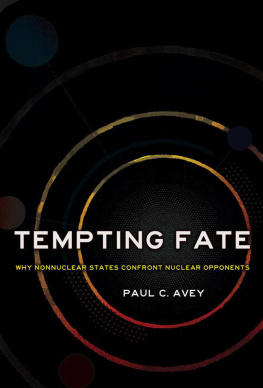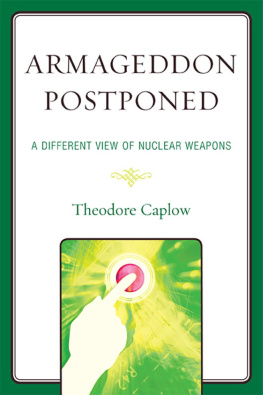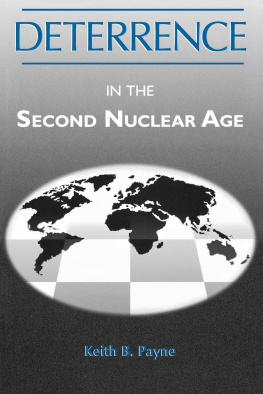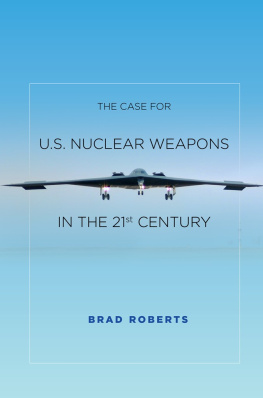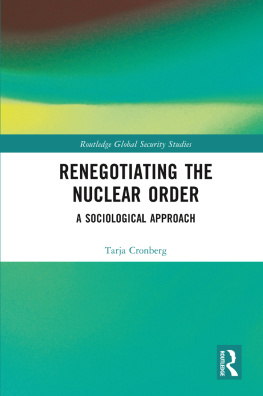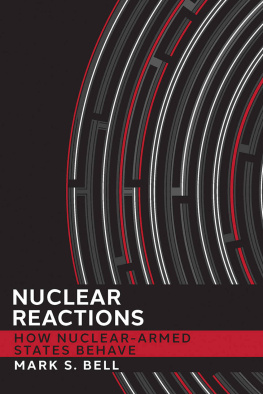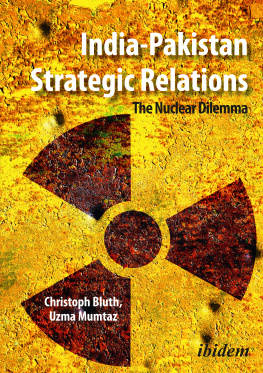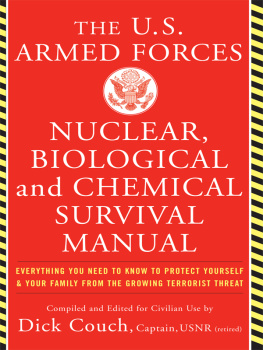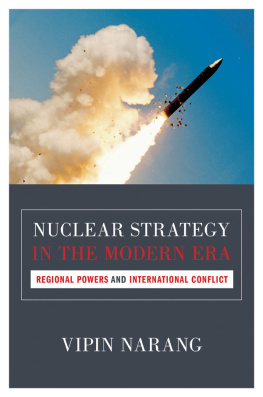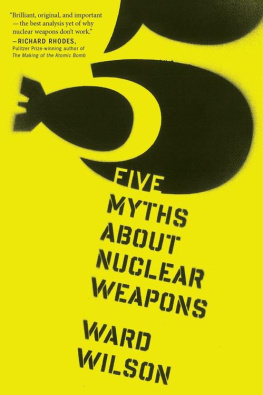Paul C. Avey - Tempting Fate: Why Nonnuclear States Confront Nuclear Opponents
Here you can read online Paul C. Avey - Tempting Fate: Why Nonnuclear States Confront Nuclear Opponents full text of the book (entire story) in english for free. Download pdf and epub, get meaning, cover and reviews about this ebook. year: 2019, publisher: Cornell University Press, genre: Politics. Description of the work, (preface) as well as reviews are available. Best literature library LitArk.com created for fans of good reading and offers a wide selection of genres:
Romance novel
Science fiction
Adventure
Detective
Science
History
Home and family
Prose
Art
Politics
Computer
Non-fiction
Religion
Business
Children
Humor
Choose a favorite category and find really read worthwhile books. Enjoy immersion in the world of imagination, feel the emotions of the characters or learn something new for yourself, make an fascinating discovery.
- Book:Tempting Fate: Why Nonnuclear States Confront Nuclear Opponents
- Author:
- Publisher:Cornell University Press
- Genre:
- Year:2019
- Rating:3 / 5
- Favourites:Add to favourites
- Your mark:
- 60
- 1
- 2
- 3
- 4
- 5
Tempting Fate: Why Nonnuclear States Confront Nuclear Opponents: summary, description and annotation
We offer to read an annotation, description, summary or preface (depends on what the author of the book "Tempting Fate: Why Nonnuclear States Confront Nuclear Opponents" wrote himself). If you haven't found the necessary information about the book — write in the comments, we will try to find it.
Paul C. Avey: author's other books
Who wrote Tempting Fate: Why Nonnuclear States Confront Nuclear Opponents? Find out the surname, the name of the author of the book and a list of all author's works by series.
Tempting Fate: Why Nonnuclear States Confront Nuclear Opponents — read online for free the complete book (whole text) full work
Below is the text of the book, divided by pages. System saving the place of the last page read, allows you to conveniently read the book "Tempting Fate: Why Nonnuclear States Confront Nuclear Opponents" online for free, without having to search again every time where you left off. Put a bookmark, and you can go to the page where you finished reading at any time.
Font size:
Interval:
Bookmark:
Tempting Fate
Why Nonnuclear States Confront Nuclear Opponents
PAUL C. AVEY
Cornell University Press
Ithaca and London
To Mom and Dad
Nuclear weapons hold out the promise of peace through the prospect of devastation. That is a dangerous bargain. The number of wars that have occurred when only one side has nuclear weapons suggest that it is also a fragile one. Regardless of whether one views nuclear weapons as a benefit or danger to humanity, they are not likely to disappear anytime soon. Like many other students of nuclear politics, then, I believe that it is important to grapple with the nature and the limits of the nuclear shadow. This book represents one contribution to that effort.
It is common in acknowledgments to note that many individuals had a profound influence on the final product. I never fully appreciated just how true that was until I went through the process myself. This book is very different today from when it began. Its strengths are due to the patience of many friends and colleagues who took time to engage with this project. Its weaknesses remain those of its author.
My biggest intellectual debt is to Michael Desch. The idea for this book took hold while I was working with him on a separate project at Notre Dame. Mike is a model for how to be a scholar, and his support has been instrumental at every stage of this book and in my career. Keir Lieber, Dan Lindley, and Sebastian Rosato shaped much of my thinking on international relations. They have each read and offered incisive comments on multiple drafts, particularly during the critical early period, and continue to provide guidance today. Frank Gavin, Todd Sechser, Nicholas Miller, James Wilson, James Cameron, and Tim McDonnell all graciously read the entire manuscript and gave up a full day to meet to discuss it. Their insightful suggestions led to significant changes that made the book much stronger. Eric Jardine, Barry Posen, Robert Reardon, Joshua Shifrinson, Rachel Whitlark, and Zachary Zwald all read multiple chapters, in many cases multiple times, and provided detailed feedback. At Cornell University Press I thank Roger Haydon, the anonymous referee, and the series editors for their direction and careful reading of the manuscript. Their suggestions helped me clarify many key claims.
Portions of this book draw on material previously published in Paul C. Avey, Whos Afraid of the Bomb? The Role of Nuclear Non-use Norms in Confrontations between Nuclear and Non-nuclear Opponents, Security Studies 24 (2015), reprinted by permission of Taylor & Francis Ltd.
I benefited greatly from the diverse intellectual environments at several institutions that provided me space to work on this book. I am grateful to each one. The research began at the University of Notre Dame and expanded with the support of the Managing the Atom and International Security Program at the Belfer Center for Science and International Affairs at Harvard University. The Stanton Foundation provided generous funding to allow me to spend a year with MITs Security Studies Program. I thank Chris Alkhoury for his excellent guidance through the Iraqi documents then held at the Conflict Records Research Center. The John G. Tower Center for Political Studies at SMU offered me the ability to refine my thinking at a key stage of the project. I owe special thanks to Joshua Rovner for his support and willingness to discuss a wide range of issues while I was there and since. I finished the book as a faculty member in the political science department at Virginia Tech, which offers a collegial and stimulating environment spurred on by a wide range of perspectives. It is a great place to call home.
For helpful conversations, feedback, and support, I thank Megan Becker, Mark Bell, Kirstin J. H. Brathwaite, Robert Brathwaite, Stephen Brooks, Matthew Bunn, Peter Campbell, Mauro Caraccioli, Fotini Christia, Owen Cot, Rebecca Davis-Gibbons, Franois Debrix, Priya Dixit, Melissa Emmert, Greg Endicott, Charles Fagan, Patrick Flavin, Gene Gerzhoy, Nicholas Goedert, Kim Hedge, James Hollifield, Karen Hult, Caitlin Jewitt, Jason Kelly, Karin Kitchens, Margarita Konaev, Alexander Lanoszka, Christine Leah, Chad Levinson, Timothy Luke, Susan Lynch, Sean Lynn-Jones, Richard Maass, Martin Malin, Jonathan Markowitz, Steven Miller, Vipin Narang, Scott Nelson, David Palkki, Soul Park, Abigail Post, Bruce Pencek, Dianne Pfundstein Chamberlain, Miranda Priebe, Besnik Pula, Ray Rafidi, Matthew Reitz, Joli Divon Saraf, Ji Hye Shin, Gregory Shufeldt, Ray Thomas, Edward Weisband, and William Wohlforth. My sincere apologies to anyone I have forgotten.
Most of all, I thank my family. I dedicate this book to my parents, Kathy and Donald. Their support at each stage of my life has been unwavering. I would not have been in a position to even begin this book without them. Their biggest influence, though they may not know it, has been through their own example of humility, fairness, and hard work. I have tried to bring these traits to my research and how I live my life. My sister, Laura, has offered her encouragement as long as I can remember. I could not ask for a better one. Finally, I thank my wife and best friend, Megan. Her grace and good humor while we moved from Indiana to Massachusetts to Texas to Virginia made completing this book possible. She is an unfailing source of love and support to a grateful husband.
Surveying the devastation in Japan after World War II, the United States Strategic Bombing Survey concluded that no more forceful arguments for peace and for the international machinery of peace than the sight of the devastation of Hiroshima and Nagasaki have ever been devised. Any country that lacked a nuclear arsenal would find itself vulnerable, unable to prevent becoming the target of a nuclear strike by threatening retaliation on the same scale.
Despite these weapons awesome power, though, countries without nuclear arms have not shied away from challenging and resisting nuclear-armed states. In 1948, less than three years after the United States had demonstrated its willingness to use nuclear weapons, the Soviet Union blockaded Berlin, directly challenging the American nuclear monopoly. The Soviets then stood firm for nearly a year against US efforts to undermine that blockade. Two years later, the young Peoples Republic of China attacked US troops in Korea. Egypt and Syria combined to launch a massive assault on Israeli forces in October 1973. Iraq ignored US threats in 1990, and Serbia did likewise in 1999. In 1979, nonnuclear Vietnam fought a war against nuclear-armed China. The list goes on. According to one widely used conflict list, there have been sixteen wars between nuclear weapon states and nonnuclear weapon states from 1945 to 2010 and hundreds of lower-level militarized disputes. During that same period there were nineteen wars between states with no nuclear weapons. In other words, wars in which one side holds a nuclear monopoly occur about as often as those between states where neither side has nuclear weapons. Moreover, the nonnuclear weapon state (NNWS) frequently starts the trouble. In other cases,
Why has the absolute weapon so frequently failed to impress states without it? This type of conflict is puzzling for both deterrence and compellence explanations. Bernard Brodie, whose early writings served as the foundation for thinking about nuclear politics, and whom nuclear strategist and Nobel laureate Thomas C. Schelling called the dean of us all, wrote that certainly a monopoly of atomic bombs would be a sufficiently clear definition of superiority to dissuade the other side from accepting the gage of war unless directly attacked.
In perhaps the most important statement on the nuclear revolution, Robert Jervis argued that mutual vulnerability induced restraint. Yet even then states without nuclear weapons should give in to all but the most extreme demands rather than risk a conflict in an environment of intense vulnerability.
Next pageFont size:
Interval:
Bookmark:
Similar books «Tempting Fate: Why Nonnuclear States Confront Nuclear Opponents»
Look at similar books to Tempting Fate: Why Nonnuclear States Confront Nuclear Opponents. We have selected literature similar in name and meaning in the hope of providing readers with more options to find new, interesting, not yet read works.
Discussion, reviews of the book Tempting Fate: Why Nonnuclear States Confront Nuclear Opponents and just readers' own opinions. Leave your comments, write what you think about the work, its meaning or the main characters. Specify what exactly you liked and what you didn't like, and why you think so.

